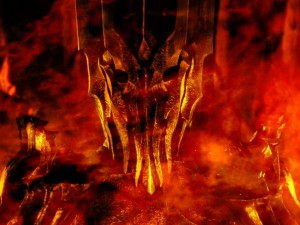 In this piece on his blog Midgardsmal, linguist David Salo writes about how he derived various Orkish dialects used in the Lord of the Rings films from his own extrapolations of Black Speech, and
In this piece on his blog Midgardsmal, linguist David Salo writes about how he derived various Orkish dialects used in the Lord of the Rings films from his own extrapolations of Black Speech, and
about his thoughts on the approach Sauron might have taken in putting together Black Speech itself.
Since I had so little direct linguistic information about Black Speech to go on other than what could be gleaned from the Ring-inscription (object suffixes -ul, -ulûk; verbal infinitive (perhaps) ending -at; abstract ending -um in burzum “darkness”, containing the same burz element seen in Lugbúrz “Dark Tower”; postposition -ishi “in”) I had to go on à priori notions of what a language such as Black Speech might be like — I had to get inside the mind of Sauron, and try to figure out what somebody like the Dark Lord of Mordor might put into his language.
As a matter of fact, this is something I had thought about some years before. As an undergraduate in college, I had contributed to a set of ongoing stories, where each participant wrote additional chapters and introduced characters and events as he or she pleased. Into one of these stories I introduced the character (played partly for humor, partly tragically) of a misfit Orc who, sometime after the fall of Mordor, had found himself transported through time and space into a new environment. On introducing this Orc, I thought it would add a touch of realism to let him speak in his own language; so I sketched the outline of what I imagined Black Speech might be like, and wrote a couple of paragraphs in it.
I have no idea if any copy of this text survives somewhere in my files. At any rate, I made no direct use of it, except for one small element that I retained in memory, the first person pronoun za — possibly suggested by Avestan azəm.
What I did retain, however, was the overall notion of Black Speech as a complex but consistent language, rich in affixation and inflection, but with a wholly transparent morphology. Indeed, the transparency of the morphology, the lack of any phonetic alterations between morphemes that could obscure the structure, would help explain the prevalence of clashing consonant clusters; morphemes ending in one consonant were jammed up against morphemes beginning in another, with nothing to ease the transition.
Sauron, I imagined, was an enormously practical person, who would have made the Black Speech as “perfect” (according to his notions of perfection) as he could make it, with a rigorous consistency and logic, but without making any allowance for æsthetics. It would not eschew borrowings from other languages of Middle-earth, but it would adapt them to its own style. It would in fact have been, as my friend Helge Fauskanger terms it, Sauron’s Esperanto.


